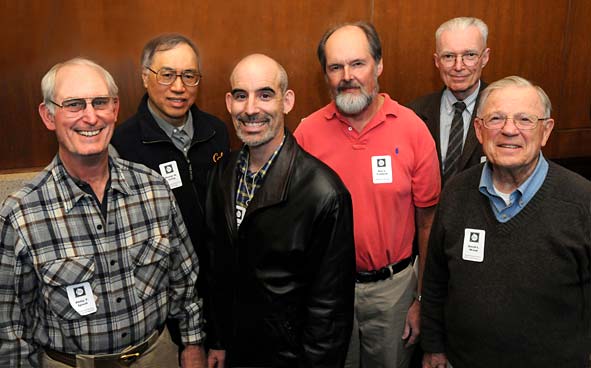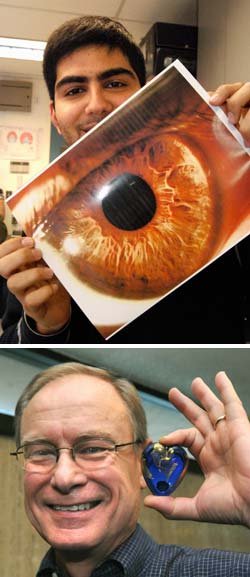 Each of the faculty members shown above has taught 20 or more Freshman and Sophomore Seminars since the program's inception in 1992. From left: Philip Spieth (environmental science, policy, and management), George Chang (nutritional science and technology), Benson Tongue (mechanical engineering), Roy Caldwell (integrative biology), David Wright (history of art), and David Wood (environmental science, policy, and management). (Peg Skorpinski photo)
Each of the faculty members shown above has taught 20 or more Freshman and Sophomore Seminars since the program's inception in 1992. From left: Philip Spieth (environmental science, policy, and management), George Chang (nutritional science and technology), Benson Tongue (mechanical engineering), Roy Caldwell (integrative biology), David Wright (history of art), and David Wood (environmental science, policy, and management). (Peg Skorpinski photo)'Pockets of intimacy' for undergrads
Freshman and Sophomore Seminars bring faculty and students together to learn from each other
| 26 February 2009
FSS by the numbers
2,428 seminars have been offered since 1992
726 people have taught in the program — most of them Senate faculty but also lecturers, librarians, emeriti, and the occasional high-level campus administrator or official from UC’s Office of the President.
3 emeriti have taught 20 or more freshman or sophomore seminars
emeriti have taught between 10 and 20
3,000 the (approximate) number of students who take one of the program’s seminars each year
91 campus departments and programs that have participated in the program since its launch in 1992
Quirky seminar names attract young scholars
• Arguing With Judge Judy: Popular Logic on TV Judge Shows (Daniel Melia, rhetoric)
• Animal and Human Navigation: Which Way Is Home? (Roy Caldwell, integrative biology)
• Darwin and Hardy (Kevin Padian, integrative biology)
• Dognition: How Dogs Think (Lucia Jacobs, psychology)
• Rabbis in Love: Stories of Sex From the Talmud (Daniel Boyarin, religious studies)
BERKELEY — For entering students at Berkeley, faculty may seem to exist on a rarified plane, one entirely inaccessible to them. The Freshman and Sophomore Seminars (FSS) program, which began in fall 1992, counters that assumption by giving students just starting their campus careers meaningful intellectual contact with faculty. An unintended consequence of the program is that faculty, too, benefit from teaching small groups of lower-division students.
Benson Tongue, professor of mechanical engineering, counts himself among that number. When he signed on to teach 15 freshmen about musical acoustics in 1997, he was surprised by their enthusiasm and excitement. Had Berkeley, he wondered, “beaten down the spirits” of his junior, senior, and graduate students? Teaching freshmen has made him work to reignite the fire in his upperclassmen — “which means I had to become a better teacher,” he says. “Ultimately, teaching my freshmen taught me.”
Tongue didn’t stop at that first freshman seminar — he has gone on to teach 20 more (including seminars about birding and one called The Art and Science of Wheels).
On Feb. 2, Tongue, seven other faculty who have reached the 20-seminar milestone, and 59 others who have taught 10 or more were honored at Alumni House in the first awards ceremony for the FSS program.
Vice Provost for Teaching and Learning Christina Maslach, who oversees the program, told the group, “What is really fun about [FSS] for an instructor is that you get to teach something near and dear to your heart.” Those who teach in the program can — and often do — wander outside their usual intellectual playgrounds, taking the opportunity of a one-unit, pass/no pass seminar to teach topics that intrigue them. One former chancellor, an academic statistician, focused on local small-theater productions; more recently, a biologist has offered a seminar on Thomas Hardy’s novel Tess of the d’Urbervilles, and a nutritional-science prof is currently teaching a seminar in Asian martial-arts movies.
At the ceremony, Executive Vice Chancellor and Provost George Breslauer noted that many faculty who participate in the FSS program come from professional schools where they might teach only graduate students. A willingness to “extend down to the undergraduate level says something special about you,” he told the honorees, and also reflects well upon a campus that provides “these pockets of intimacy for our undergraduates.”
Breaking down barriers
 Talk about an engaged pupil: Cyrus Modavi, top, is a student in an optometry seminar taught by Professor Richard Van Sluyter as part of the Freshman and Sophomore Seminars program. It's the 23rd time Van Sluyter (above, displaying a recently awarded token of appreciation from program organizers) has taught the lower-division seminar.
(Peg Skorpinski photos)
Talk about an engaged pupil: Cyrus Modavi, top, is a student in an optometry seminar taught by Professor Richard Van Sluyter as part of the Freshman and Sophomore Seminars program. It's the 23rd time Van Sluyter (above, displaying a recently awarded token of appreciation from program organizers) has taught the lower-division seminar.
(Peg Skorpinski photos)The Freshman Seminar Program (its original name; sophomores were added to the mix in 2004) began at a time much like this one, when the University of California was coping with cuts in its state funding. In her remarks on Feb. 2, Maslach recalled hat the state Legislature had been considering a bill to increase the faculty’s teaching load; in response, the Berkeley campus sent the lawmakers a description of the fledgling seminar program. The fact that faculty participated on top of their usual responsibilities so impressed the legislators that they pulled support from the bill, Maslach said, assuring them that, over and above the other gratifications participation in the program has brought them, there was “a political outcome to all of your dedication and commitment.”
The then-new Freshman Seminar Program was championed by the late Arnold Leiman, a professor of psychology and advocate of undergraduate education, and John Heilbron, a professor of history who was Berkeley’s vice chancellor during the program’s early years. Alix Schwartz, director of academic planning for the undergraduate division of the College of Letters and Science, has kept FSS running since it began.
“People love this program,” says Schwartz. “Once you start teaching these seminars, you get hooked. Not too many people teach one or two and then stop completely. It’s one of those rare programs that’s rewarding to everybody — the students, the faculty, the campus, donors, and the Legislature.”
Although Richard Van Sluyters now finds his work in the program gratifying, teaching his first freshman seminar put the professor of optometry in new and not particularly comfortable territory. “I had always thought I was a pretty good teacher,” he recalls, but he found himself struggling in his first seminar on the human eye. Van Sluyters, who is also associate dean for student affairs in the School of Optometry, had approached the seminar as “just another lecture course” until midway through the semester, when he realized none of his 15 students had spoken.
Van Sluyters tried several strategies to get the conversational ball rolling before hitting on a solution. Now, at the first meeting he begins by asking students why they enrolled in the seminar. Their answers, which typically range from interest in various optometry-related subjects to the desire to pursue a career in the field, help generate a list of topics for the semester.
Teaching lower-division students has been a revelation for him. Not only are they “plenty bright,” but they’re at an age “where everything is interesting. They haven’t ruled stuff out.” Van Sluyters tells them, “If you come to class and have a body temperature above 96, you will pass.” And so they participate, he says, because “they’re not worried about making a mistake or getting a good grade.”
Van Sluyters has taught his course 23 times, and each time has seen shy or reticent students become comfortable talking to him: “That barrier between student and faculty member, between young person and older person ... that barrier goes away.” He continues teaching the seminar, he says, for “not entirely altruistic reasons.” For one thing, it enables him to teach undergraduates. “Holy smokes, that’s what we do!” he says. “And it’s really fun — if you like to teach.”
To learn more about Freshman and Sophomore Seminars, visit fss.berkeley.edu or contact Alix Schwartz at 642-8378.

